
Most predictions regarding technology have become harsh realities these days – smartphone addiction is real and can and will affect people of all ages. Checking on your smartphone is the first thing you do in the morning, before you even get out of bed. You take it with you everywhere and you use it whenever you have a minute or two – just checking on your social media.
While in theory, the issue would not be that bad, it can have long-term consequences on your social capabilities. Sure, you can use the smartphone to entertain yourself, shop and make payments – even get work. But at the same time, your social life will be affected – most people would rather spend a few minutes on their smartphones than socialize with those around them.
Fast Facts on Smartphone Addiction
- An astounding 47% of Americans admit that they are addicted to their phones
- The typical American looks at their phone 352 times per day
- 44% of adults agree that not having their phones with them causes them anxiety
- 60% of children spend at least 4 hours using smartphones per day
No one says you should give up the smartphone completely. It is useful and handy quite often. But at the same time, you need to find a balance between your social life and technology. With these thoughts in mind, here are some of the best books on smartphone addiction, as well as how they can help against it.
What Are The Most Relevant Books on Smartphone Addiction?
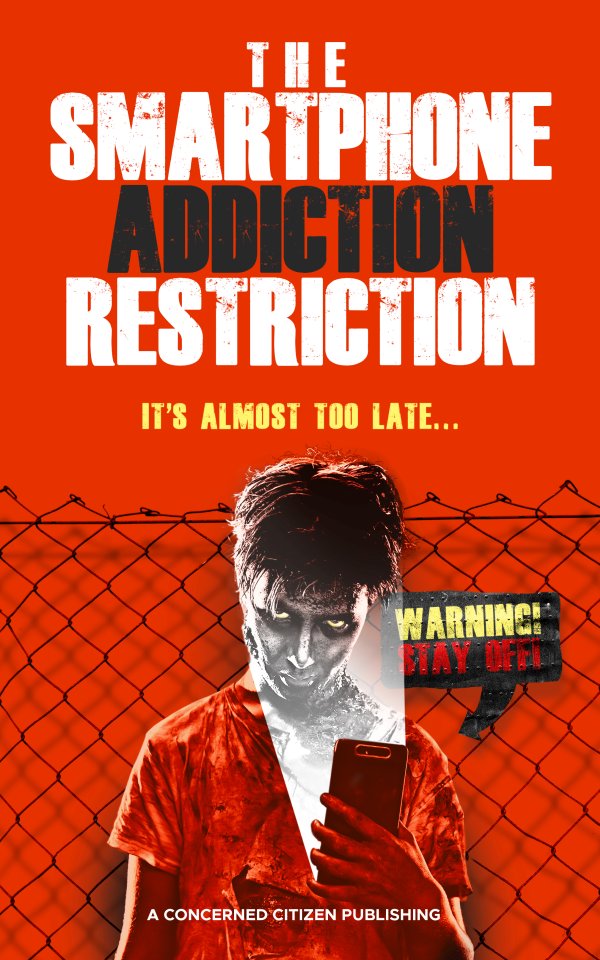
The Smartphone Addiction Restriction, by A Concerned Citizen Publishing
Smartphones are convenient, easy to use and capable of many things. After all, a small device can act like a job search device, CD player, GPS, camera, landline and so on. All these benefits have a cost though. Most people – especially youngsters – fail to understand the dark side associated with technology. Most people do not even realize they are trapped in addiction.
Smartphones have harsher effects on youngsters – especially children. They fail to socialize and can no longer see things from a critical point of view. On the same note, kids are more likely to face anxiety and depression, not to mention failing to develop skills that will help them later on in life. There is some light at the end of the tunnel though – this addiction can be kept under control and actually healed.
This book will explain how smartphones have become such addictive these days, as well as how people will end up spending up to five years of their lives tapping and swiping. You have a personal test that will help you realize how addicted you are, as well as a bunch of things you will have time for once you overcome this addiction – everything available in easy and straightforward step by step instructions.
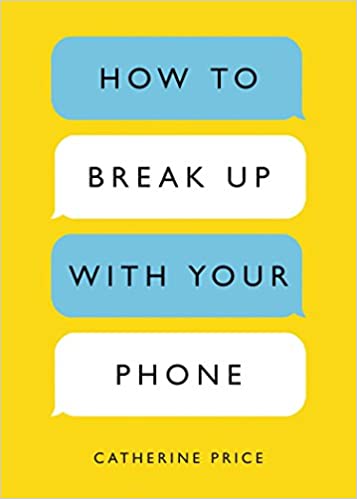
How to Break Up with Your Phone, by Catherine Price
This book is excellent for anyone who owns a smartphone, whether you think you are addicted or not. Having a smartphone will give you a certain level of addiction and this is what the book will help you control. If you are the type who wants to spend a few minutes on the smartphone and ends up wasting hours, this is one of the top-rated social media addiction books to consider.
How to Break Up with Your Phone is a practical guide. It provides a hands-on approach and step by step details on how to fix the issue. The goal is not to quit the smartphone or technology. Instead, the award-winning journalist is trying to help people develop a healthy relationship with their devices – at the end of the day, smartphones are helpful.
You will learn the psychology behind smartphones and applications, but also why they are designed to become addictive in the long run. You will also discover some of the side effects of spending too much time with technology – such as stress, the incapability to focus or think, as well as the lack of new memories with your loved ones.
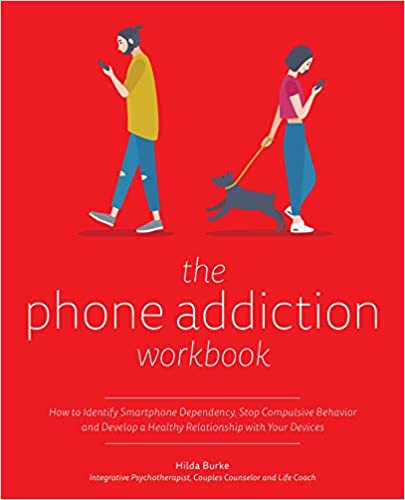
The Phone Addiction Workbook, by Hilda Burke
The smartphone is a powerful device that has seriously changed people’s lives. It is handy to have around and allows you to do a bunch of things, improving your life in multiple ways. It does not mean that you always need to keep an eye on it or check your notifications every few minutes. Only this process itself can seriously add to your stress levels. This book will add a healthy point of view to this relationship.
The author is pushing to help people take back full control of their lives. Learn to enjoy small things in life and focus on your family and friends, rather than a device that provides a different reality. On the same note, it is important to know that smartphone addiction is similar to other addictions – substance abuse or perhaps gambling.
Long term consequences vary widely from one individual to another, but most people will clearly end up with intimacy issues, insomnia and other sleep-related problems, depression and anxiety or a lack of social skills. This book is not just an education tool, but it also comes with a program that will help you get back to normal – written by a psychotherapist, it has everything you need to make an easy change.
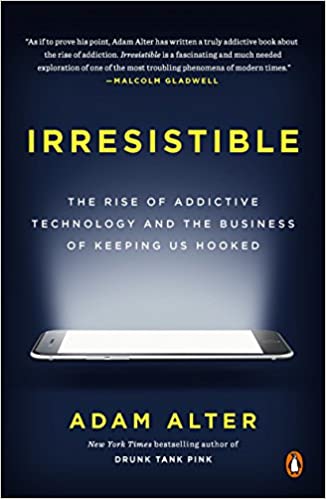
Irresistible, by Adam Alter
No one can deny it – this is the age of behavioral addiction. Basically, pretty much every individual out there is addicted to one behavior or another. People in western countries are obsessed with their news feeds, social media notifications, likes and so on. They check on videos and trailers, as well as random reels that could get them to spend hours a day staring at a small screen.
This book is a revolutionary release coming from a professor of psychology. The author discusses the rise of technology and how it has become irresistible to most people – but especially to youngsters. This is not an accident though – everything has been planned in the smallest details. All these devices and platforms are designed to become irresistible and cause addiction in the long run.
The author explains how reverse engineering behavioral addiction works and what you can do to regain your social skills and start meaningful relationships again. While no one claims you should give up useful products, there are ways to keep them under control and limit their use in order to save time, money and relationships with those around you.
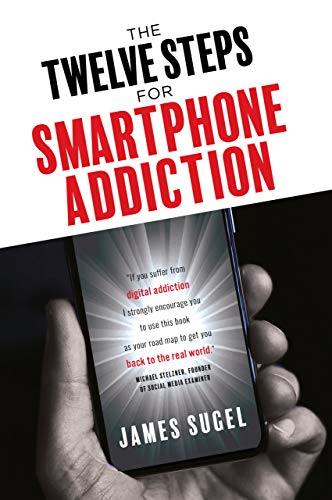
The Twelve Steps For Smartphone Addiction, by James Sugel
The so-called 12 steps are not necessarily related to technology. In fact, this concept has been successfully implemented in the 1930s for Alcoholics Anonymous. The steps have been adapted overtime and have become incredibly successful in treating all kinds of addictions. They have been used against gambling, food and – why not – technology.
This book is now applied to modern technology. It is among the most efficient books on smartphone addiction and aims to tackle a phenomenon that seems to take the world over at an alarming speed. While adults can still have some control over technology, kids are often among the main victims. Loads of people crave technology, which will also affect sensory skills and capabilities, causing addictions.
The book has been adapted to work on digital addiction. It is about understanding the addiction and figuring it out. Moreover, it brings in a core of values that will seriously change the addict’s life. Even people who are not addicted (or so they believe) can learn some useful things and figure out how to control their hunger for technology.
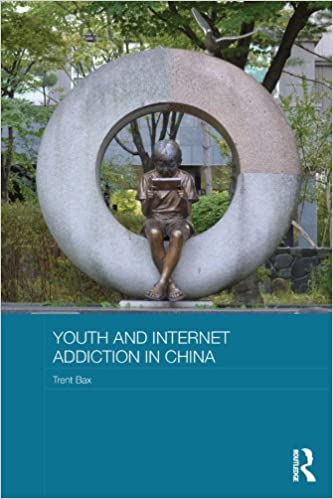
Youth and Internet Addiction in China, by Trent Bax
You do not necessarily need to be Chinese or live in China in order to benefit from one of the best social media addiction books. Instead, the book is aimed at anyone who is addicted to Internet, as well as everything that it implies – from social media networks and random news to unlimited reels and hours of your day going down the drain.
Some people refer to the Internet as electronic opium. It affects a lot of young individuals. At some point, this addiction becomes so harsh that lots of people will actually need to take their children to psychiatrists. People facing this addiction will soon let the Internet take their lives over – no more social interactions and no more meaningful relationships. It is all part of a digital reality that they take for real.
The book features comprehensive research and discussions with psychiatrists and parents – even addiction victims. It is based on the Chinese society because while parents do insist that good grades and hard work will pay off in the long run, children are more obsessed with games and other online activities. It is an educational tool, but also a helpful guide for those in need.
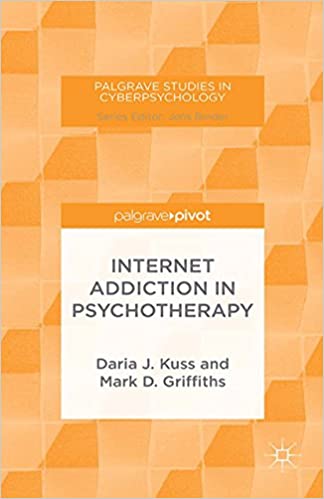
Internet Addiction in Psychotherapy, by Daria J. Kuss and Mark Griffiths
Internet addiction – also known as a smartphone or social media addiction – has always been a warning to the global community. Everyone ignored it and everyone feels like they are actually in control – they are not. The actual addiction has become a thing these days and some researchers claim it is the most common pandemic of the 21st century.
There are more options when it comes to the actual treatment. There are also different theories on what the best intervention would be. However, just like any other addiction out there, this one asks for some comprehensive research upfront. Furthermore, it all begins with the patient – if you can admit you have an addiction, you are on the right path.
This is one of the most direct books on smartphone addiction. It is based on multiple interviews with people who actually deal with this addiction on a regular basis. About 20 psychotherapists from six countries added their contributions and described their personal experiences with this addiction. Furthermore, the book aims to help the reader understand when problems arise.
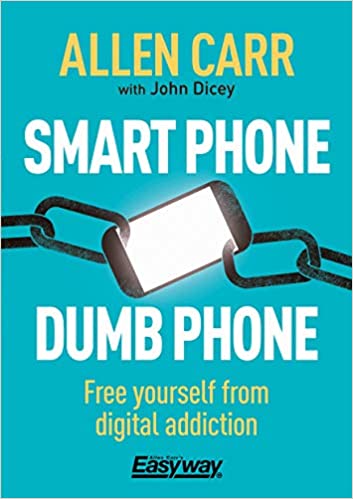
Smart Phone Dumb Phone, by Allen Carr and John Dicey
If you are the type who pulls out the smartphone whenever there are a few minutes to spare, chances are you have an addiction. Why would you see the same content or check on the phone when there is something who you can talk to instead? Do you feel anxious when your phone is not in sight? Is it in the car? Did you leave it in the bathroom? Anxiety kicks in straight away – this is an addiction.
Allen Carr has a solid reputation in helping people overcome addictions. In fact, his most significant book (also turned into a movie) has helped people from all over the world quit smoking. He is now back on track to help those suffering from another addiction – the smartphone issue. What showed up as a helpful innovation – the smartphone – has gained full control over people’s lives.
But the good news is technology will turn against you if you actually let it. In other words, this book will clear out all the brainwashing associated with smartphones, social media networks and the Internet. It is Allen Carr’s way to help people overcome addictions and based on the success of this book, it seems to work wonders – whether or not you admit this addiction.
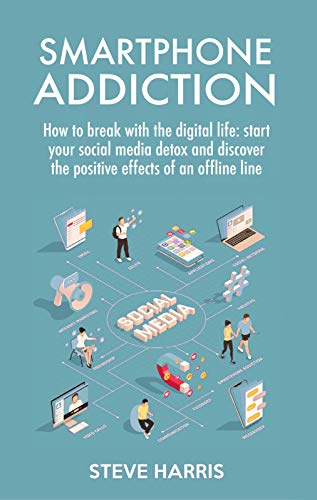
Smartphone Addiction, by Steve Harris
You may not realize it, but your mobile phone is actually dangerous to you. You end up losing hours swiping and browsing without realizing it. You check your phone before bedtime, as well as before getting out of bed. Most people claim they only give it a quick check or they take a look, but this is an addiction – even if you do not admit it, this is one of the best social media addiction books and it can help.
It is just how the human brain works. You get hits of dopamine and feel happy when you see new posts or notifications. The same rule applies when you see matching symbols in gambling or lots of cigarettes in the pack – no anxiety whatsoever. In the long run, these so-called happy hits will affect your behavior, ability to focus or socialize, as well as your interpersonal relationships.
Indeed, a smartphone will also bring joy and lots of useful features. But then, without your smartphone, you tend to feel alone. You suddenly experience happiness again once you see or grab it. This book will show you how to take back control of your mind. It will teach you how to control technology and make it work for you, rather than the other way around.
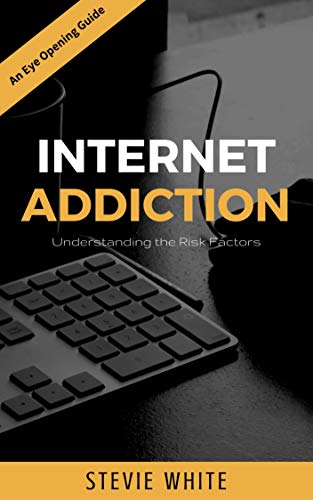
Internet Addiction, by Stevie White
Internet addiction is no longer a warning, an idea or a potential problem of the future. It is present in everyone’s lives and it is often rated as a clinical disorder. It often requires treatment as well and withdrawal symptoms can be quite problematic – similar to other addiction that do not involve brain altering chemicals. In other words, the Internet goes in the same basket with food, gambling or shopping.
In some parts of the world, this issue has become a public health concern. The author aims to describe the Internet phenomenon and the good things associated with it. At the same time, he aims to explain how this phenomenon can become an addiction, even if addicts often claim they are in full control of their lives. The implications are also explained in small details.
Furthermore, the book provides access to a framework that will help people recover. There are exercises and ideas to try out in order to get rid of this addiction. Even if you believe a smartphone is only a useful tool, this book may help you reveal a few things about yourself that you were not aware of – great if a loved one suffers from this addiction too.
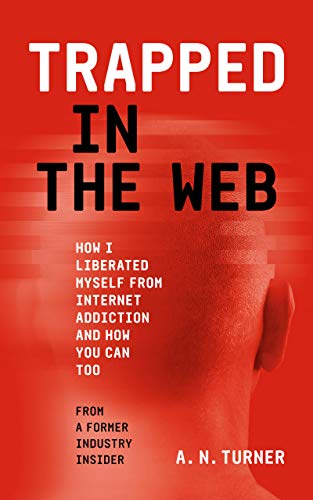
Breaking the Feedback Loop, by A. N. Turner and Ben Beard
Loads of people – children, adults and elders – are addicted to the Internet. It is not a surprise though – you can do anything online, like working, shopping or enjoying a break. The Internet is often rated as a harmless addiction, but the truth is its consequences can be devastating in the long run. You might be aware of some of them – anxiety, stress, social isolation and even suicide.
This so-called digital sexual stimulation is part of a loop. Once drawn in, people are addicted to various things. Some of them need their likes on social media, while others must always keep an eye on their emails. A quick glance at the phone to look at notifications is just as harmful and can bring in serious issues in the long run.
This book is so well written that it can simply pull you out of this loop. You can get out of the matrix and regain control of your life. Technology is helpful, but you need to learn how to keep it under control. Some parts of this book can be described as a manifesto. Some others include parts of the author’s life. But then, you have the self help chapters that will change your life too.
Final Thoughts on the top Books on Smartphone Addiction
Bottom line, these are some of the best books on smartphone addiction. They are not necessarily written as self-help books. Instead, they are educational and can help you understand technology.
They can help you determine whether you have a slight addiction or a big one. Moreover, they will teach you how to overcome such issues, whether they affect you or a loved one.
If you face with other addictions too, please check our collection of addiction recovery books.
